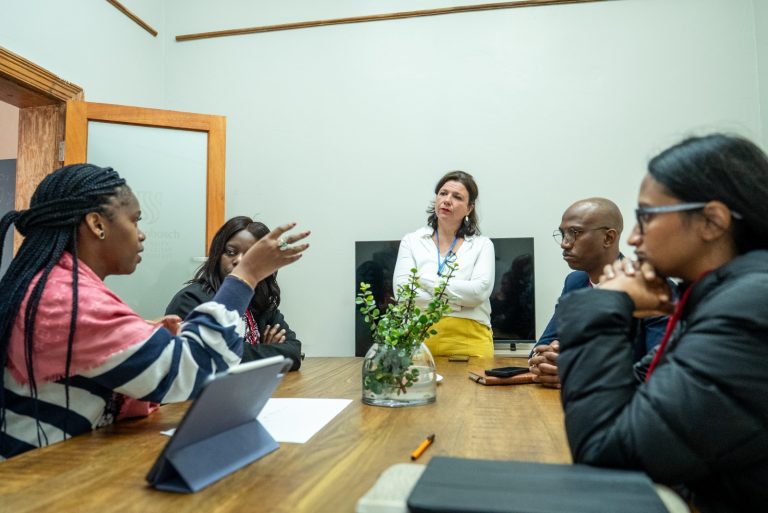Impact Hub, a global network of more than 130 hubs in 70 countries, has officially launched in the Cape Winelands – the first Impact Hub in the Western Cape, and the second in South Africa. The new hub aims to create an enabling environment for entrepreneurs seeking to make a difference in their communities, connecting them to government, academia, business, and civil society to co-create solutions to some of South Africa’s most pressing challenges.
“Those closest to the societal challenges are also closest to the solutions,” says Marli Goussard, CEO at Impact Hub Cape Winelands. “Our role is to equip, connect, and support local impact entrepreneurs and organisations so that solutions are not only designed by and for communities, but owned by them meaning they benefit economically, not merely socially.”
She explains that when communities help create and own the solutions to their challenges, they’re not only more empowered and invested in making them work, but local ideas lead to practical, lasting change because they draw on real knowledge of what’s needed. “This builds trust, strengthens community ties, and results in local initiatives that are more effective and fairer than solutions imposed from outside.”
Unlike traditional entrepreneurship incubators, Impact Hub Cape Winelands bridges academic research, policy influence, and grassroots impact entrepreneurship.
The focus is on community-owned impact businesses, which Goussard explains means Impact Hub will support many small but meaningful ventures that are owned by local community members seeking to create change in their locality rather than chasing the next “unicorn” (a privately held start-up business with a valuation of $1 billion or more).
Why the Cape Winelands?
Goussard points out that Stellenbosch and the wider Cape Winelands represent one of the starkest contrasts between wealth and poverty in the world. South Africa contends with some of the world’s highest levels of inequality, measured by the widely used Gini index. This inequality is manifested in skewed income distribution, unequal access to opportunities, and regional disparities.
While the Western Cape’s Gini coefficient, a measure of income inequality, is lower than the national average of 0.68, it remains among the highest in the world. The province’s per capita income and household expenditure data reveal deep spatial inequality and stark wealth disparities across racial lines – making it second only to Gauteng in terms of inequality, according to the Western Cape Government’s 2023 Socio-Economic Profile.
Income inequality has also risen in the Cape Winelands District, where historic inequities and apartheid-era spatial dynamics have concentrated wealth in towns such as Stellenbosch, Paarl, and Franschhoek. Nationally, the top 10% of individuals own 86% of South Africa’s aggregate wealth, while in the Cape Winelands, 50.3% of the region’s population of just over 900,000 people live below the upper poverty line.
With a history of partnering for impact and unique strengths, the region also brings together world-class academic institutions, leading local businesses, and local, under-resourced communities with incredible potential, making it an ideal place to test new models for impact and inclusive growth.
Practical examples
While Impact Hub Cape Winelands has only just launched, it’s already working with Fix Forward, an NGO that helps building-trade graduates from TVET Colleges to build a business. Through this partnership, they are exploring a circular economy project alongside Stellenbosch University, teaching small building contractors to turn construction and mining waste into proven alternatives to cement – enabling local entrepreneurs to build sustainable livelihoods whilst protecting the environment.
Goussard says improving access to community healthcare is a priority for Impact Hub Cape Winelands over the next three years, so future projects might (for example) include training and equipping local health workers with simple diagnostic tools to run micro-enterprises that provide affordable healthcare directly in their communities.
Creating an “impact ecosystem”
Impact Hub Cape Winelands is inviting engagement from a broad range of stakeholders, including:
- Government: to help design policies and local economic development plans that make it easier for local impact entrepreneurs to thrive.
- Universities and colleges: to bring impact innovation into teaching and research and co-develop ideas and prototypes with local communities.
- Non-profits: to find ways of unlocking economic value in the communities they serve, developing impact franchising opportunities for local impact entrepreneurs.
- Businesses: to support local suppliers, build local partnerships, and make their B-BBEE spending count through enterprise and supplier development.
- Entrepreneurs and students: to join training programmes, access support, and connect with other like-minded impact makers driving change.
- Funders: to provide patient, long-term funding and help measure what really makes a difference.
Plans are also underway to establish a dedicated Impact Hub space in Stellenbosch, creating a physical home for incubation, collaboration, and community building.
“For us, success will be a thriving ecosystem of small, locally owned ventures in the Cape Winelands and beyond creating economic activity and dignity in vulnerable communities, supported by academia, government, and business,” says Goussard.


